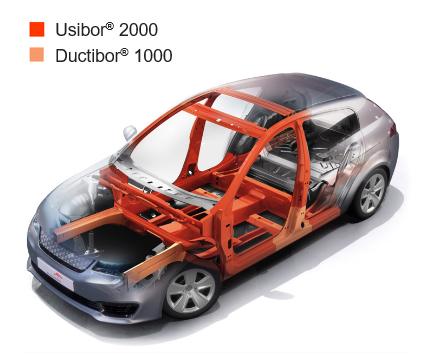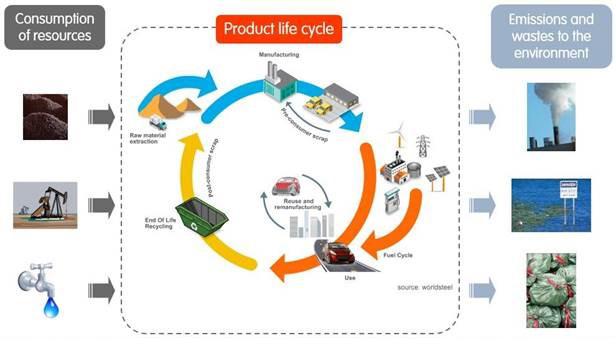Products
Product pages available in
EN - DE - FR - ES
Sustainability
News, events and stories

Press hardenable steels for safer, lighter, and environmentally friendly vehicles
February 2021
ArcelorMittal’s range of press hardenable steels (PHS) for automotive includes the Usibor® and Ductibor® families. These hot-formable grades are intended for use in the structural and safety components of vehicles. Typical applications include bumper beams, and reinforcements for doors, B-pillars, floors, and roofs. New additions to these families include Usibor® 2000 and Ductibor® 1000. These new grades are enabling OEMs to take the crash performance of their vehicles to even higher levels.
Due to their high strength, Usibor® steels are particularly suitable for anti-intrusion parts. By contrast, the ductility of Ductibor® opens the door to hot stamped BIW parts which are strongly deformed during a crash. For example, Ductibor® 1000 offers an excellent compromise between high bendability and high yield strength (> 800 MPa) at a tensile strength higher than 1000 MPa.

Using Usibor® in a direct hot stamping process is simple and cost-effective
Safer crash behaviour and low weight
When used together in a laser welded blank (LWB), Usibor® and Ductibor® can be tailored to offer unique strength and ductility combinations. Together they achieve safer crash behaviour on critical applications at minimum weight.
A study of the body-in-white (BIW) for a mid-sized sedan has demonstrated the suitability of Usibor® 2000 and Ductibor® 1000 in crash applications. The study found that the use of these grades could significantly reduce the weight of the BIW when they were deployed in passive safety structural parts. Compared to the benchmark BIW, which utilised standard advanced high strength steels (AHSS) in strengths up to 1000 MPa, weight savings of up to 30 kilograms (30 percent) were possible while maintaining the same crash performance. When compared to an advanced BIW - which makes extensive use of first generation of PHS grades such as Usibor® 1500 and Ductibor® 500 - a mass saving of 10 percent is possible.
Both Usibor® 2000 and Ductibor® 1000 are commercially available worldwide. The grades are produced in Europe, China, and North America and have already been deployed in several vehicles in serial production.

ArcelorMittal’s second generation PHS grades are helping to make cars lighter and safer than ever
Coatings enhance hot stamping process
Almost 85 percent of the PHS sold are finished with an aluminium-silicon (AlSi) coating. As well as reducing the risk of corrosion, these coatings allow hot stampers to utilise the most cost-effective and flexible hot stamping processes.
During 2021, ArcelorMittal will release the next generation of substrates and coatings for hot stamping. These products will further the lightweighting potential of PHS while enhancing crash safety, corrosion protection, and process efficiency.
ArcelorMittal’s internal sustainability experts have used the life cycle assessment (LCA) approach to assess the environmental performance of the new grades. The lighter weight of parts realised with Usibor® 2000 and Ductibor® 1000 more than offsets the slight increase in emissions from the hot stamping process.

An LCA analyses the potential environmental burdens of a product or service during production, use, and end-of-life
More information






